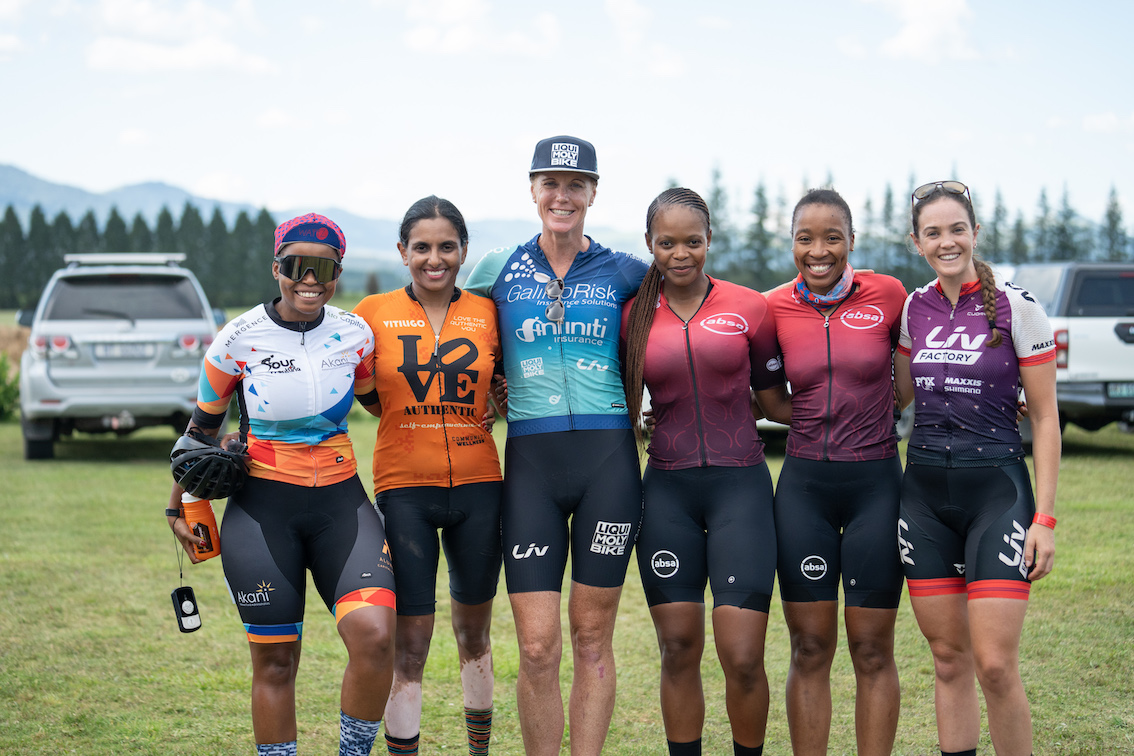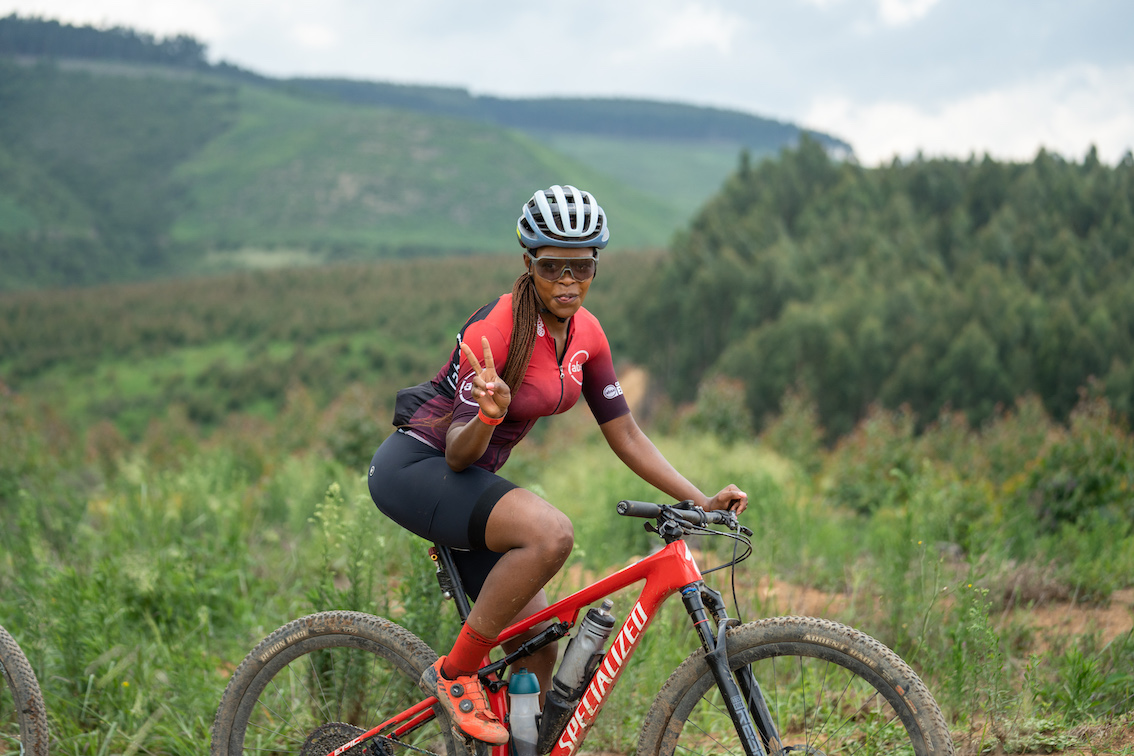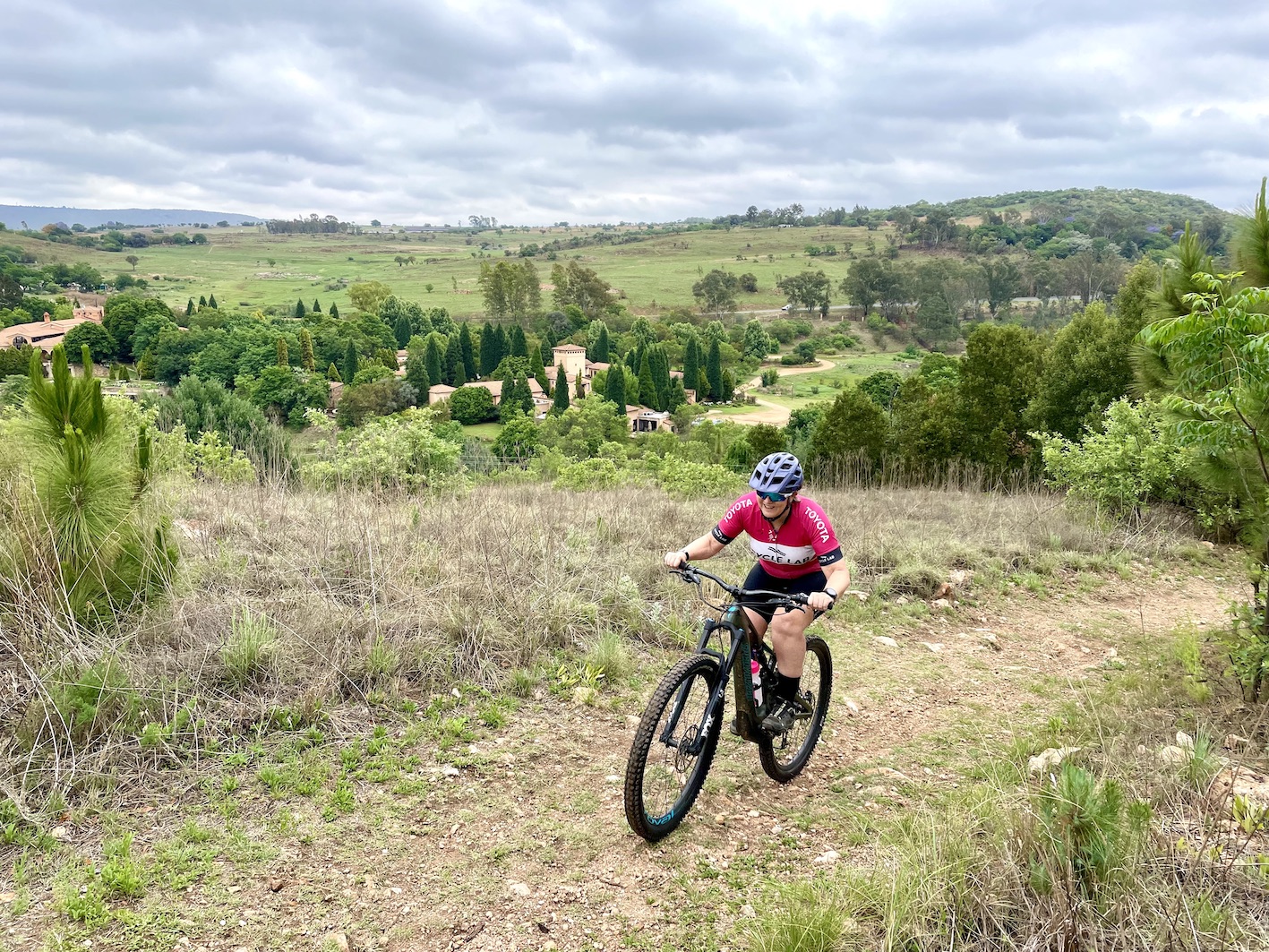Cycling in general and mountain biking in particular, are male dominated. It takes guts, resolve, nerves of steel and commitment, and for most women, that’s just to walk into their local bike shop to start their journey of buying a bike. Absa, the long-time sponsor of the Cape Epic, has committed to changing this. But how?
By Joanne Badenhorst
Having been involved in the South African mountain biking scene since the early 1990’s, from supporter, team manager, social rider, race organiser, media to ride guide, I have experience across most sectors. I’ve watched in wonder as this sport has grown from a fringe cycling discipline to one of the most popular participation sports in the country. And to this day, as a woman, I still encounter challenges in the industry. Barriers, mostly unintentional and organic due to the nature of mountain biking, exist and it’s a challenge for most women just to do regular rides in a safe environment.
So, when hearing in 2020 that one of the sport’s biggest sponsors, Absa, was launching the #SheUntamed initiative, obviously my interest was piqued. Then Covid-19 hit and put the world – and this campaign – into pause mode.

“In February 2020, Absa launched #SheUntamed, a platform to encourage more female participation in the sport of mountain biking and cycling in general. The bank aims to offer greater opportunities for women who are living an active lifestyle, are passionate about cycling and are ready to take on the challenge of mountain biking racing.”
That’s from the original press release two years ago. Fast forward to 2022 and, as the pandemic peters out, Absa is ready to relaunch the #SheUntamed initiative.
“The #SheUntamed campaign aims to make the Absa Cape Epic more inclusive by increasing the number of women participants within the next three years” – is Absa’s commitment, which officially relaunched this past weekend at an Absa Cape Epic training camp in Karkloof, KwaZulu-Natal.

Let’s look at some stats on women at the Absa Cape Epic:
Between 2006 and 2019 (14 years), the average number of women that enter the Cape Epic is 112. That’s out of a total entry number average of 1232. So, on average, during the 14 years (pre-Covid-19), women make up 9% of the field. An average of 72 women are in Mixed Teams and 40 in Women’s Teams each year. The highest number of Mixed Teams is 76 (2009) and the highest number of Women’s Teams is 27 (in 2013 and 2017).
Nine percent is low. Most three-day stage races in South Africa get around 20% females entered (Mixed and Women’s teams combined). But we are talking about the Absa Cape Epic, which is one of the toughest mountain bike races in the world. It’s an eight-day race, which, in the past five years, has had average distance of 638km and an average of 14916 metres of vertical ascent. To finish one stage is a challenge. To complete the entire event demands incredible fitness, strength, stamina and skill. But for most women, actually starting the Cape Epic remains the biggest challenge.

According to the 2021 South African Mountain Biking Survey, presented by Garmin , women make up 20.98% of the market (up from 15.88% in 2019). That’s more than a 4% increase in two years. So there’s definitely growth in the women’s segment, which Absa’s #SheUntamed campaign can draw from.
What is the #SheUntamed campaign? Well, it’s not been finalised yet, but It was relaunched with the naming of five #SheUntamed ambassadors: Sarah Hill, Letshego Zulu, Hannele Steyn, Remofilwe Moeketse and Buhle Ngobese. These are women that are already mountain bikers and all of whom have completed at least one Cape Epic. Steyn has completed all 17 editions!

In 2014 the Absa Cape Epic boosted the women’s prize money to equal that of the men’s. One of the objectives at the time was to grow the number of women competing, but unfortunately that hasn’t really happened. There were 23 women’s teams in 2013 and an average of 20 from 2014 until 2018. In 2019, there were just 18… That’s confirmation that it’s not the prize money that motivates women to enter the Cape Epic.
The amount of commitment, time and money to enter and complete an Absa Cape Epic, is definitely out of reach for most women.

You need to be able to put in 12-20 hours a week of training, including a few long endurance rides and skills improvement sessions. Rest is just as important. Actual rest with your feet up. Then you need to fit in arranging your nutrition adequately – regular diet and supplements for energy and recovery. That’s besides managing your family’s needs, work commitments and any other challenges like illness, or injury or just an unexpected life event. There’s build-up races and training camps too. And bike maintenance and spares to manage and pay for…
We are more unselfish by nature, usually putting children, husbands and jobs before our own needs or wants. It certainly takes all the planets being aligned to pull it off and a very supportive network of family, friends and colleagues. It can be done, as an average of 112 women prove each year; it’s just more challenging than for our male counterparts.

Each of the Absa #SheUntamed ambassadors was given an opportunity to answer questions and speak about the challenges and rewards that come with completing a Cape Epic.
“As women, we are generally not as competitive as the men, but we make up for it in being driven,” said Sarah. However, it takes a lot more that being driven to even get to the start line of an event such as this.
Letshego, who has completed two Cape Epics, is a single mother who revealed that she needs a live-in nanny and a very organised diary to get her to the Cape Epic start line.
Hanele is one of just four mountain bikers to have completed every single edition of the Cape Epic. She won the second edition and has seen many changes as the event has evolved and grown.

“When I won in 2005 the prize was a drawing from one of the local school children and the entry fee was R3750. But I have come to know that Cape Epic riders are a special species. It’s a great privilege to be able to do a Cape Epic. When people ask me how I feel, I don’t want to say I feel good, but… I want to be able to say I feel great!”
For perspective, the winning women now get R300 000 for the title. The prize money pays down to 10th position on both General Classification and per stage. The entry fee for the 2022 edition is R98 900 (for a team of two).
Undoubtedly, the investment from sponsors like Absa has helped the event grow from its humble roots as a South African endurance sports challenge to the most prestigious mountain bike stage race in the world, gaining the mainstream recognition it deserves.

Not all humans are keen on hours of discomfort and voluntary suffering, which is essentially what the Cape Epic is. Some humans are strange though, that ‘special species’ that Hanele refers to, who like to suffer, to push themselves to their limits. Most women I know ride for the health and fitness benefits, enjoying the outdoors and spending time with mountain biking friends. Many of them will never consider doing a Cape Epic.
Then there are women like Remofilwe and Buhle, who in 2021, became the first black South African female team to finish a Cape Epic. It was a significant challenge for them, but they were motivated to finish.
“The feeling at the finish line, it is addictive,” says Remofilwe, while Buhle adds: “Every stage finish is emotional”.

And it’s those feelings that make the suffering worth it. That make the sacrifices worthwhile. The personal reward and emotional boost of accomplishment that comes from completing the challenge.
So how does Absa plan to “offer greater opportunities” for women to get into mountain biking and be “more inclusive by increasing the number of women participants within the next three years”? We are eagerly awaiting to hear their plans.
One thing is certain, there’s a very enthusiastic, growing base of female mountain bikers for them to work with. And I do know that if a woman puts her mind to something, with the right support, and the right sisterhood around her, she can achieve whatever she sets out to do.
GALLERY





————–
Joanne Badenhorst started mountain biking in 1991 and currently heads up the Cycle Lab Active Women (CLAW), creating multiple weekly opportunities for women in Gauteng to get into the sport of mountain biking, from beginners to social/intermediate. CLAW offers fun focused, non-intimidating, women only, guided rides as well as educational and tech talks and weekends away. More here.



